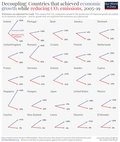Energy transition
Energy transition (German: [Energiewende] Error: {{Lang}}: text has italic markup (help)) is the transition of Germany and several other countries to sustainable economies by means of renewable energy, energy efficiency and sustainable development. The final goal is the abolishment of nuclear, coal, and other non-renewable energy sources.[1]
Germany
The key policy document outlining the Energiewende was published by the German government in September 2010, some six months before the Fukushima nuclear accident.[2] Legislative support was passed in 2011. Important aspects include:
- greenhouse gas reductions : 80–95% reduction by 2050
- renewable energy targets : 60% share by 2050
- energy efficiency : electricity efficiency up by 50% by 2050
- an associated research and development drive
Energy Transition Media
Progress of current energy transition to renewable energy: Fossil fuels such as coal, oil, and natural gas still remain the world's primary energy sources, even as renewables are increasing in use.
Example of Distributed generation use of renewable energies: Agricultural business with biogas plant and photovoltaic roof
Countries that managed to reduce their greenhouse gas emissions (working towards a low-carbon economy) while still growing their economy. This is called eco-economic decoupling.
References
- ↑ Federal Ministry for the Environment (29 March 2012). Langfristszenarien und Strategien für den Ausbau der erneuerbaren Energien in Deutschland bei Berücksichtigung der Entwicklung in Europa und global [Long-term scenarios and strategies for the development of renewable energy in Germany, considering the development in Europe and globally] (PDF). Berlin, Germany: Federal Ministry for the Environment (BMU). Archived from the original (PDF) on 27 October 2012. Retrieved 1 November 2012.
- ↑ Bundesregierung Deutschland (28 September 2010). Energiekonzept für eine umweltschonende, zuverlässige und bezahlbare Energieversorgung [Energy concept for an environmentally-friendly, reliable, and affordable energy supply] (PDF). Berlin, Deutschland: Bundesministerium für Wirtschaft und Technologie (BMWi) und Bundesministerium für Umwelt, Naturschutz und Reaktorsicherheit (BMU). Archived from the original (PDF) on 14 December 2010. Retrieved 1 November 2012.








